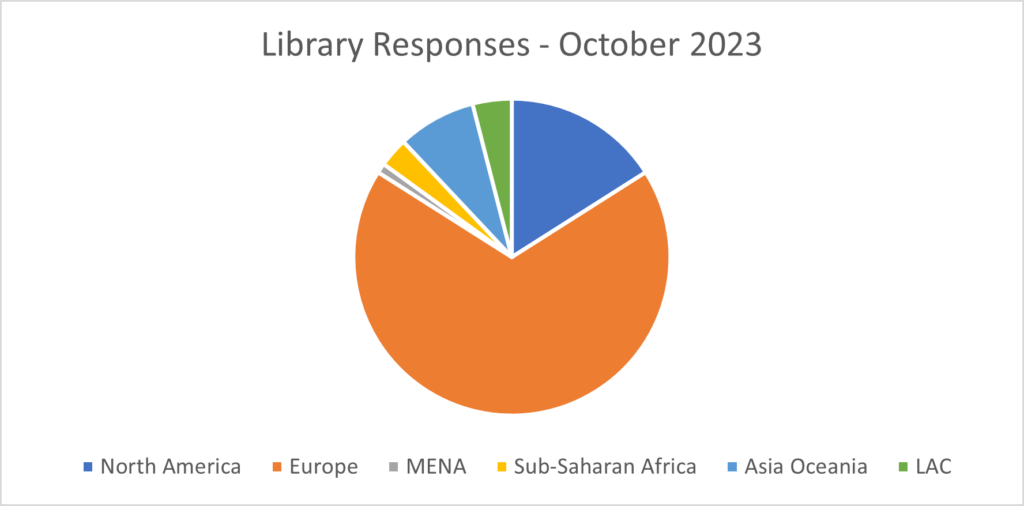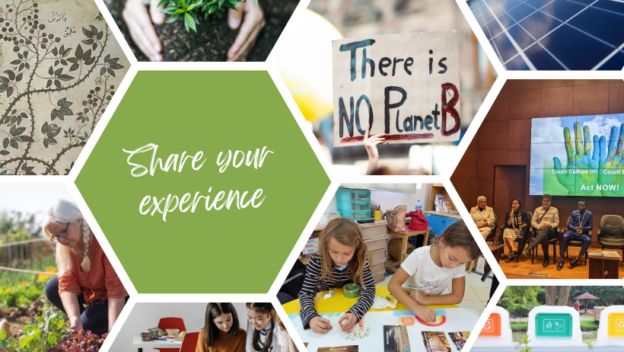IFLA is working with partners to include libraries in global indicators for climate communication and education. Including libraries on this platform will be hugely beneficial for helping policymakers, researchers, and other stakeholders understand and measure the impact libraries have on empowering climate action.
To achieve this, we are building a body of evidence through surveys on ways in which libraries take part in climate communication and education.
To date, we have received several hundred responses from libraries and dozens of responses from library associations. These early results show that libraries are approaching climate communication and education in a variety of ways, the majority of which center activities which encourage community-building and learning at all ages.
It’s not too late to get involved! Keep reading for a look at the preliminary results, then follow the links below to add your input to the survey.
- Are you participating from the perspective of a library? Take the Library Survey here.
- Are you participating from the perspective of a library association? Take the Association Survey here.
The Numbers at a Glance
The types of libraries participating in this survey so far include 34% public libraries (155/456), 26% academic/university libraries (117/456), and 5% national libraries (22/456).
The geographic spread at the moment includes 68% from Europe, 16% from North America, 8% from Asia-Oceania, 4% from Latin America and the Caribbean, 3% from Sub-Saharan Africa, and 0.01% from MENA. From these numbers, there is clearly a need to improve geographic representation.

Library Programmes
Libraries were asked how often they offer programmes, such as special events, activities, community meetings, lectures, or outreach efforts, on climate change. Over 1/3 (145/388 responses) stated they offer such programmes either frequently or occasionally.
Just about half of respondents (191/387) reported to offer programmes on sustainability issues like the environment, biodiversity and recycling either frequently or occasionally.
Engaging with Others
1/3 of respondents (118/365) either frequently or occasionally engage with students from primary and secondary schools on issues related to climate change and the environment. About 1/4 (99/367) engage to that same level with university students or researchers.
30% have established relationships with external partners to engage in cooperative initiatives or public dialogues on climate issues, with the most common of these partners being local government agencies or municipal services.
Library Resources
43% offer book recommendation lists, library guides and/or book exhibitions on climate issues for children and youth, while 46% offer similar resources for adults. Half of respondents make an effort to draw attention to online resources on climate issues via their library’s communication channels.
The majority of climate action in responding libraries has focussed on outreach and activities. A smaller percentage (30%) have constructed new buildings, renovated existing ones, or purchased new equipment which was specifically intended to reduce the institution’s impact on the climate. A slightly higher percentage (45%) have changed internal operations, such as putting new policies in place in order to promote sustainability.
The majority of responding libraries (60%) feel they have adequate resources on climate change, biodiversity and sustainability to offer their users given current public demand. However, half (50%) of respondents feels that their resources would be inadequate if public demand for these resources was to increase.
Community-based Climate Action
Survey participants were invited to share examples of their activities to promote climate action and awareness.
There were many examples of libraries partnering with local government agencies and municipal services to jointly provide opportunities for climate action. Recycling schemes set up with local waste collection services, hosting town information sessions on sustainability, arranging community seed libraries with the local farmers market, and holding cooperative programmes with local nature reserves, parks, and forestry services are some examples of outreach efforts with community partners.
Libraries also reported on positioning themselves as community hubs for sustainable practices. There were many examples of libraries providing services like food-sharing refrigerators, communal meals, bicycle rentals, mend clubs, community gardening, and film screenings.
“At the current time we have just finished a sustainable food resource management project for community strengthening via learning to cook sustainable dishes and use the resources sustainably. The project has invited community members to sit around the table, build connections and thus, learn to preserve food resources, lead sustainable households. The outcome of the project was not only a build stronger community, developed platform for sharing of the excess food but also a strong food club of 70 members”.
(Example shared from Lithuania)
Lifelong learning played a large role in the activities reported by libraries as well. There were many examples of programmes aimed at school-aged children and young learners, from clubs and hands-on workshops to story-times. There were more adult-focussed educational activities as well, such as budget cooking and food waste classes, beekeeping and gardening lessons, hosting climate change conferences, showcasing new research in lecture series and panel discussions, holding intergenerational sustainability programmes, and establishing climate groups for seniors.
We were excited to see that these results also included stories of libraries helping their communities engage in citizen science. Some examples included library-led activities in which young people or university students helped document pollution in local waterways and record the diversity of plants and animals in their community.
***
These surveys are beginning to provide a look into how libraries empower climate action through climate education and communication. With more input, we can create an even clearer and more diverse picture of how libraries can help every person understand and act in support of the climate, sustainability, and biodiversity.
Add your voice today! Surveys are available in English, Spanish, French, and Chinese.
- Are you participating from the perspective of a library? Take the Library Survey here.
- Are you participating from the perspective of a library association? Take the Association Survey here.
Contact us: [email protected]
